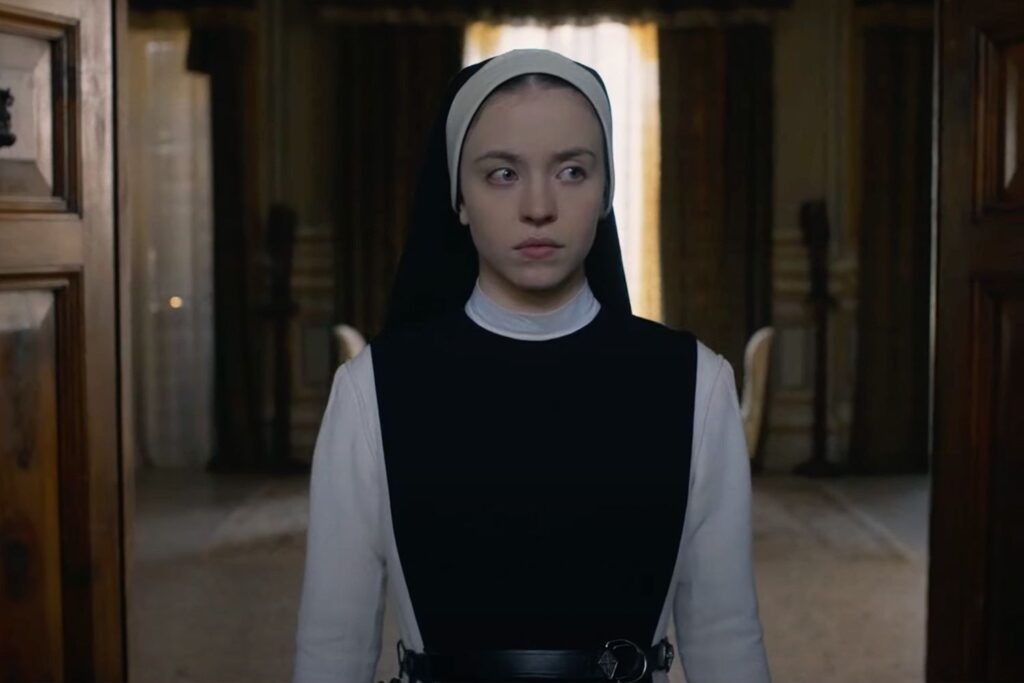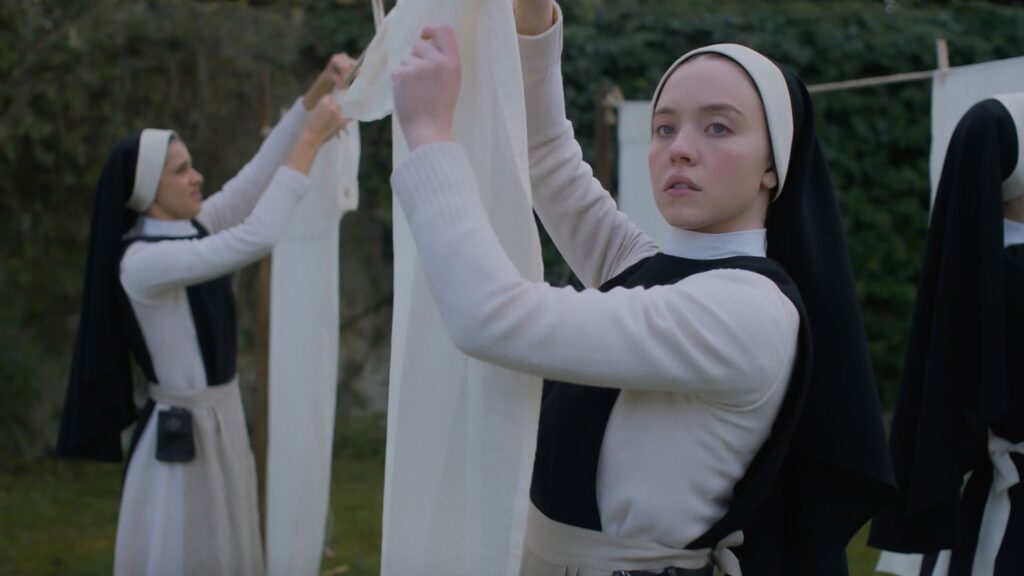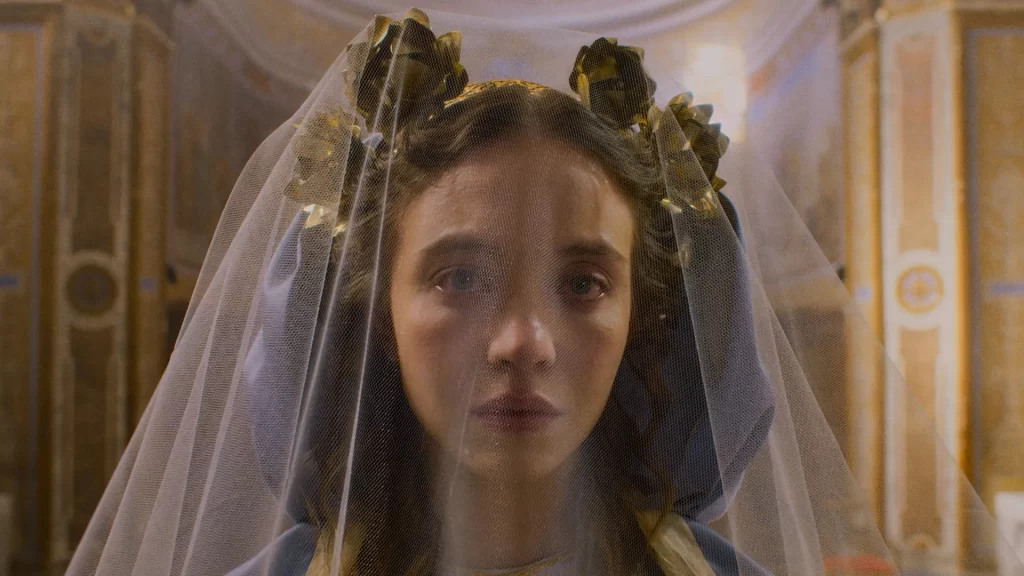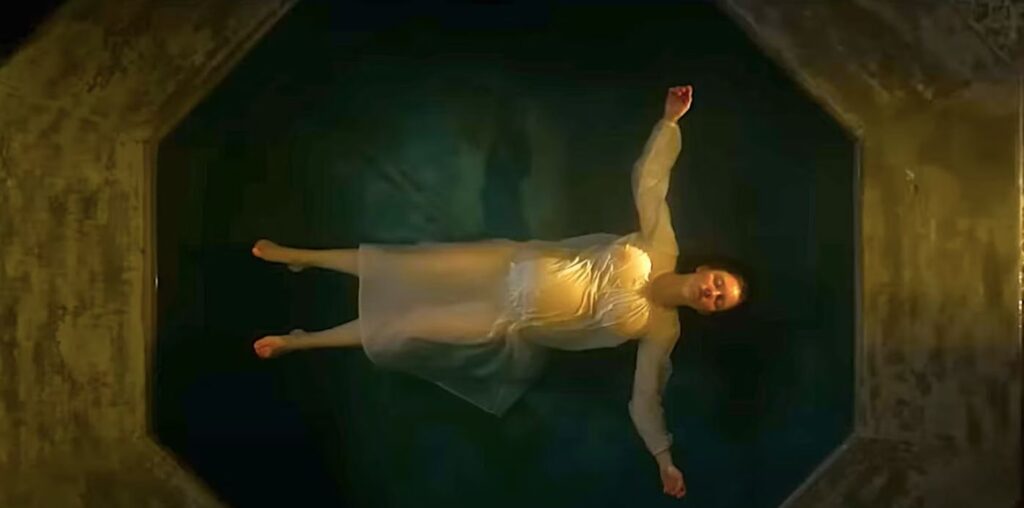
Until she cracked the box-office code with Anyone But You (still in theaters, over three months later!), Sydney Sweeney was best known for her television work: as a tempestuous sexpot on Euphoria, as a privileged troublemaker on The White Lotus, as a mentally unstable cellmate on Sharp Objects. Even as her star ascended and she appeared in more movies, the pandemic and studio hesitation conspired to prevent her from arriving on the actual big screen, as streamers gobbled up solid pictures like Reality and Big Time Adolescence… and also The Voyeurs, a spiky little thriller that dropped on Amazon a few years ago with little fanfare. Strictly speaking, The Voyeurs wasn’t a good movie, but it did showcase Sweeney’s ability to be both exotic and innocent; it also afforded its director, Michael Mohan, the opportunity to ape Brian de Palma. Now, Mohan and Sweeney have reteamed for Immaculate, a horror flick that contemplates a different sort of lusty possession.
As with The Voyeurs, Immaculate isn’t very good, but it isn’t without its guilty pleasures. As a creature of pure genre, it offers a handful of images—a watchful eye peering through a crevice to witness a sacrilegious ritual; a distant figure launching herself from a background tower—that contain a certain elemental power. The opening scene finds a young nun (Simona Tabasco, also from The White Lotus) trying to escape from an Italian convent that might as well be a medieval castle; as she fumbles frantically with the keys at the wrought-iron gate, a quartet of elders inexorably stalk toward her, like four Darth Vaders in habits. There’s no ambiguity or complexity here, just primordial terror.

Wandering into this lioness’ den with the naïveté of a helpless cub is Cecilia (Sweeney), a virginal novitiate who hopes to leave behind an unpleasant American past. She’s struggling to learn Italian, but Mohan speaks to his viewers in the universal language of horror, signposting Cecilia’s journey with obvious, ominous foreshadowing. “It isn’t too late to turn back,” a fellow sister tells Cecilia in a tone that communicates the opposite. Oh, and did you know that the convent is built atop ancient, forbidden catacombs? Don’t worry, I’m sure that’s just a trivial item which won’t turn up later.
Violent prologue aside, the opening stretch of Immaculate operates as a fish-out-of-water drama. Enthusiastic but inexperienced, Cecilia attempts to assimilate into a new environment whose codes and rituals are literally foreign to her. She befriends a rebellious colleague (Benedetta Porcaroli), displeases a surly superior (Giulia Heathfield di Renzi), and draws the eye of a suspiciously charming priest (Álvaro Morte). These scenes are pleasant enough, though the script (by Andrew Lobel) doesn’t waste time investing them with detail or color. It’s more concerned with pushing forward to the reveal implied by the film’s title: Despite never having engaged in carnal relations, Cecilia somehow—one might say miraculously—becomes pregnant.

“Of course I have been chaste!” she blurts when a cardinal questions her purity. So she has. Mohan may have previously exploited Sweeney’s sex appeal in The Voyeurs (they also collaborated on the Netflix series Everything Sucks), but here he focuses on a different part of her anatomy: her eyes. Soft and wide, they’re an ideal vehicle for conveying desperation, and as the movie progresses—as the sights Cecilia beholds grow increasingly grotesque and perverse—they become veritably cavernous, a window into the character’s perpetual nightmares.
Which are pretty much what you’d expect. For most of its runtime, Sweeney’s scream-queen presence is about all Immaculate has going for it. Mohan makes shrewd use of his heroine’s face, but his technique as a horror director is dispiritingly workmanlike. All of the jolts on display are standard-issue: the startling freak-outs revealed as dream sequences, the long silences punctuated by jump scares, the fraught close-ups designed to warp your perspective. Done well, such shocks can be unbearably tense despite their familiarity, but the “Boo!” moments in Immaculate are clunky and hacky.

Perhaps Mohan was trying to pace himself, because in its final 15 minutes, Immaculate sloughs off its superior influences and becomes memorable in its own right, as Sweeney’s latent ferocity shifts it into a peculiar variant on the rape-revenge picture. It isn’t quite accurate to say that the movie’s ending redeems it entirely—unlike priests, critics don’t treat finales as a chance for absolution—but as Cecilia crawls through crypts and slings crucifixes, her plight transforms from ponderous to pleasurable. She may be tipped to birth the messiah, but she’s most comfortable administering her own, distinctly savage brand of last rites.
Grade: C+
Jeremy Beck is the editor-in-chief of MovieManifesto. He watches more movies and television than he probably should.
